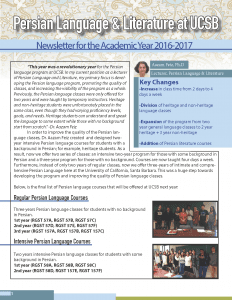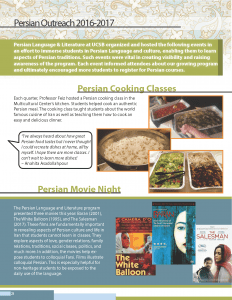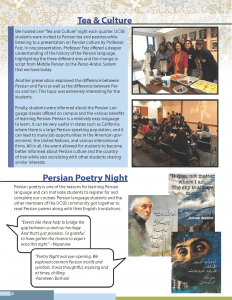The Department of Religious Studies at the University of California, Santa Barbara, offers a graduate program in South Asian religions for M.A. and Ph.D. students. Graduate students specializing in South Asian religions are expected to obtain expertise in the history, texts, and languages of South Asian religious traditions along with an understanding of contemporary issues in South Asian religions and cultures.
The graduate program in South Asian religions has faculty resources to support specialization in the following traditions:
- Hindu Traditions: William Elison, Barbara A. Holdrege
- South Asian Islamic Traditions: Juan E. Campo
- South Asian Buddhist Traditions: Vesna Wallace
- Tibetan Buddhist Traditions:
Upon entering the graduate program in the Department of Religious Studies, each graduate student will be assigned a faculty mentor, who will assist the student in planning a program of study that accords with his or her area of specialization within South Asia. Once the student has selected his or her principal faculty advisor, who will chair the M.A. or Ph.D. committee, the faculty advisor will assume the advisory role previously assumed by the faculty mentor.
The graduate program requirements for students specializing in South Asian religions include the following components:
- Core Seminars
- Advanced Seminars and Additional Coursework
- Language Training
- Field Research
Core Seminars
All graduate students must complete five out of the following core seminars. Each student will consult with his or her faculty advisor in order to determine which five of the core seminars are required for the student’s area of specialization within South Asia. These seminars constitute the core curriculum of the graduate program in South Asian religions, which is designed to give students a broad historical overview of the major texts and traditions of South Asia. The core seminars will generally be offered over the course of a three-year cycle.
- RG ST 206B. Seminar on Vedic Traditions (Holdrege)
- RG ST 206C. Seminar on Epic Traditions
- RG ST 206D. Seminar on Bhakti Traditions (Holdrege)
- RG ST 209A. Seminar on South Asian Islamic Traditions (Campo)
- RG ST 216A. Seminar on South Asian Buddhist Traditions (Wallace) or
- RG ST 254A. Seminar on Tibetan Buddhist Traditions
Ph.D. students who previously completed a graduate seminar in one of the areas covered by the core seminars, as part of their Master’s work at another university prior to enrolling at UCSB, may petition to have the non-UCSB seminar count towards the fulfillment of that particular core seminar requirement. In such cases, the student will select, in consultation with his or her advisor, an advanced seminar to substitute for the particular core course requirement.
All students—whether M.A./Ph.D. or Ph.D.—are expected to complete a minimum of five graduate seminars in the area of South Asian religions during their graduate studies at UCSB.
Advanced Seminars and Additional Coursework
In addition to the core curriculum, each graduate student is expected to plan a program of study, in consultation with his or her faculty advisor, that includes a series of advanced seminars in his or her area of specialization within South Asia. The faculty advisor may also recommend the completion of a number of undergraduate courses to fill in gaps in the student’s knowledge of South Asian religions. The following advanced seminars are currently offered in the department:
- RG ST 206A. Seminar in South Asian Religious Studies (Holdrege, Wallace)
- RG ST 206E. Seminar on Tantric Traditions of South Asia (Wallace)
- RG ST 206F. Seminar on Philosophical Traditions of South Asia (Wallace)
- RG ST 206G. Seminar on Hindu Discourses of the Body (Holdrege)
- RG ST 206H. Seminar on Pilgrimage Traditions of South Asia (Holdrege)
- RG ST 206I. Seminar on Comparative Ethics in South Asia (Wallace)
- RG ST 206J. Seminar on Contemporary Issues in South Asian Religions (Holdrege)
- RG ST 206K. Seminar on Visuality in Traditions of South Asia (Elison)
- RG ST 209B. Seminar on Hindus and Muslims in South Asia (Campo)
- RG ST 216B. Seminar on Theravada Buddhist Traditions (Wallace)
- RG ST 254B. Seminar on the Study of Tibet from the Missionaries to Cultural Studies
- RG ST 254C. Seminar on Indo-Tibetan Buddhist Philosophy
- RG ST 256. Seminar in Jain Studies (Wallace)
Language Tracks
All graduate students are expected to learn at least two Asian languages and to pursue one of the following language tracks. Each student will consult with his or her faculty advisor in order to determine which program of language study is most appropriate for the student’s area of specialization within South Asia.
Hindu Studies
Track 1: Classical Hindu Studies. Students focusing on the study of classical Hindu textual traditions are required to complete the following language training:
- Four years of Sanskrit
- Two years of Hindi, Tamil, Bengali, Marathi, Punjabi, or another modern South Asian language
Track 2: Modern Hindu Studies. Students focusing on the study of modern Hindu traditions are required to complete the following language training:
- Three years of Sanskrit
- Three years of Hindi, Tamil, Bengali, Marathi, Punjabi, or another modern South Asian language
Islamic Studies
Track 5: Transregional Islamic Studies. Students focusing on the study of South Asian Islamic traditions in the broader context of their interconnections with the Arab and Persian Middle East are required to complete the following language training:
- Four years of Arabic
- Two years of literary Persian
Track 6: Regional Islamic Studies. Students focusing on the study of Islam within the South Asian region are required to complete the following language training:
- Three years of Arabic
- Three years of literary Persian or three years of Hindi-Urdu, Punjabi, or another modern South Asian language
Buddhist Studies
Track 7: South Asian Buddhist Studies. Students focusing on the study of South Asian Buddhist traditions are required to complete the following language training:
- Four years of Sanskrit (including Pali and Buddhist Hybrid Sanskrit)
- Two years of a second Asian language relevant to the study of Buddhist traditions (for example, Tibetan, Sinhala, Mongolian, Chinese, Japanese, or Korean)
Track 8: Tibetan Buddhist Studies. Students focusing on the study of Tibetan Buddhist traditions are required to complete the following language training:
- Four years of Tibetan
- Two years of a second Asian language relevant to the study of Buddhist traditions (for example, Sanskrit, Chinese, Japanese, or Korean)
Language Training
UCSB currently offers courses in the following languages: Sanskrit, Pali, Hindi, Punjabi, Tibetan, Arabic, Persian, Chinese, Japanese, and Korean. If a graduate student’s area of research requires training in other languages, such as Tamil, Bengali, Marathi, Nepali, Sinhala, or Mongolian, the student may arrange to study these languages in language training programs outside UCSB.
- Year-long or summer intensive programs at the University of California, Berkeley
- Summer intensive programs at the South Asian Summer Language Institute (SASLI) at the University of Wisconsin
- Summer intensive programs at other universities or institutes in the United States
- Year-long or intensive programs at a university or institute in India, Nepal, Pakistan, Sri Lanka, Tibet, or Mongolia
Field Research
All graduate students are required to undertake a period of field research in South Asia. The duration of residency in South Asia and the specific nature of the student’s field research will be determined in consultation with his or her faculty advisor.















